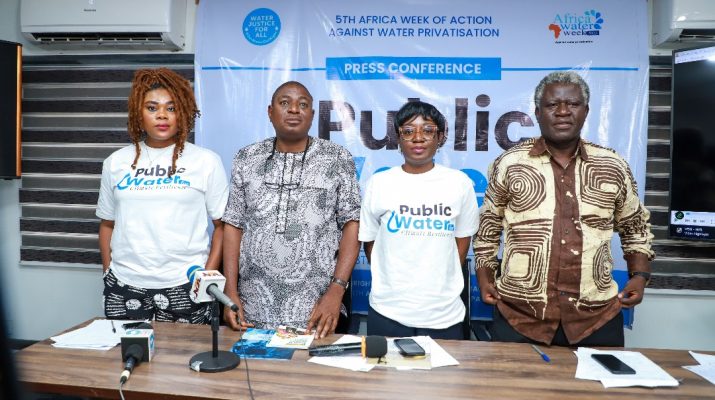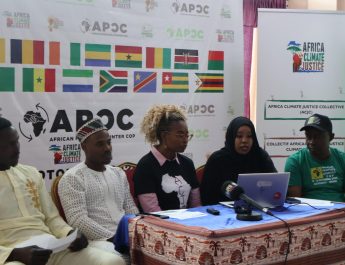Since the privatization of public utilities has consistently failed globally in delivering quality service across multiple sectors like electricity, waste, health and education, civil society groups, being the last conscience of humanity are demanding the return of public utility, especially water services, to public management, otherwise known as re-municipalization
By Edu Abade and Dafe Favour
In what has become the global trend for managers of water resources, who have consistently failed to deliver quality and reliable water services to their clients, civil society organizations, community networks, youth groups, trade unions and grassroots movements across Africa have risen against privatization of water services and are demanding urgent re-municipalization of water and other public utilities in the power, health and other critical sectors.
To that extent, advocates of re-municipalization converged on Lagos for fifth edition of the Africa Week of Action Against Water Privatization, a continent-wide mobilization organized by the Our Water Our Right Africa Coalition (OWORAC) from October 13 to October 18, 2025, with the theme: Public Water for Climate Resilience, maintaining that the campaign will assert OWORAC’s simple, consistent and urgent claim that water remains a public good and a human right, which must never be surrendered to profit motives under any guise.
Speaking at a media briefing to commemorate the Africa Week of Action Against Water Privatization, Executive Director, Corporate Accountability and Public Participation Africa (CAPPA), Akinbode Oluwafemi said the event was convened by OWORAC in partnership with the Africa Make Big Polluters Pay (MBPP) Coalition to resist all attempts to place public utility services in private hands.
“Every year, this week-long resistance brings together an alliance of grassroots movements, labour unions, civil society organizations and community leaders united by a simple conviction that water is a human right and public trust, not a commodity for profit.
“This year’s event is particularly significant for two reasons: firstly, and for the first time in OWORAC’s organizing history, this Week of Action is being held in partnership with the Africa Make Big Polluters Pay (MBPP) Coalition, a continent-wide network of organizations demanding for climate justice and corporate accountability for environmental harm.
“Essentially, this partnership symbolizes the deepening recognition that water justice and climate justice are inseparable and that to privatize water in an era of escalating climate shocks is to compound vulnerability and institutionalize inequality,” he stated.
Oluwafemi added, “We are delighted to have the United Nations Special Rapporteur on Human Rights to Safe Drinking Water and Sanitation, Pedro Arrojo-Agudo, which affirms the global dimension of our struggle and signals that the fight for equitable, publicly governed water systems is not confined to any geography.
“It is a universal human rights demand rooted in the moral premise that life itself cannot be commodified. We thank you for your steadfast advocacy and for continuing to illuminate the dangers of water privatization, while affirming the promise of democratic, climate-resilient alternatives.”
He explained that at a time for stronger, publicly accountable systems to guarantee universal access, there is instead a growing pressure to privatize water systems and hand control of the essential resource to profit-driven corporations despite overwhelming public opposition.
“While nature cries for justice in the face of the climate emergency, capital smells opportunity. Multinational corporations now peddle desalination and other privatization schemes as climate solutions, selling back to us the very water that belongs to the people. We reject these false solutions and assert that the way we protect and govern water will determine whether our communities can endure the crises ahead,” he added.
In his intervention, Water Campaign Director for Corporate Accountability (CA), Neil Gupta, said defending water means defending life itself, adding, “Unfortunately, there is an entire industry that aims to exploit our need for water to profit. Multibillion-dollar corporations and their wealthy shareholders, mostly based in the Global North, have made riches from privatizing community water systems across the globe.
“The fact that these corporations see the Global South and the African continent in particular, as theirs for the taking is what makes international solidarity across our movement so essential. While some might try to convince us that certain schemes like public-private partnerships don’t count as privatization, but we can’t be fooled, this is about corporate control of water.
“At its core, privatization of essential services like water shifts the priority from ensuring universal access to maximizing profit for the corporation and its shareholders. This explains why, in case after case, country after country, water privatization is all too often followed by unaffordable tariff hikes, labor abuses and job cuts and dangerous cost-cutting.
“Water privatization also poses a dire risk to our ability to collectively adapt to and mitigate the worst impacts of climate change. Simply put, the short term profit incentives of the private sector are fundamentally incompatible with the long term planning and investment that the climate crisis requires.
“Private water corporations recognize the huge sums of money to be made from privatizing a service we all need to survive. The largest multinational water privatizers in the world are the French corporations Veolia and Suez, which rake in billions every year, leaving a decades-long track record of abuse in their wake.”
Others who spoke to the subject matter of water scarcity in the midst of plenty water in Africa include Arrogo-Agudo; Coordinator, Africa Water Justice Network, Leonard Shang-Quartey, Representative of Senegal Water Justice Network (SWJN), Fatou Diouf; Gender CC, Women for Climate Justice, South Africa, Ndivile Mokoena, Dean, Faculty of Social Sciences, University of Lagos (UNILAG), Prof. Adelaja Odutola Odukoya and Assistant Executive Director at CAPPA, Zikorah Ibeh, among others.
Programme Officer for Water Campaign, CAPPA, Sefa Ikpa, who delivered the press text for the week of action, stressed that “the choice of this year’s theme reflects the reality and severity of the moment.”
It stated that Africa faces multiple and overlapping environmental challenges and climate change in particular, often reveals itself most forcefully through water, adding, “Across the continent, intense and prolonged droughts, devastating floods, coastal erosion and increasing unpredictability in rainfall are disrupting lives and livelihoods.
“In the Horn of Africa, successive seasons of drought have dried rivers and wells, leaving millions dependent on humanitarian aid. In places like Mozambique and Nigeria, catastrophic cyclones and floods submerge boreholes and wells, leaving thousands without safe water and compounding outbreaks of water-borne diseases.
“In North Africa, rising seas push saltwater into fragile coastal aquifers, while intensifying heat drains rivers and reservoirs through rapid evaporation, leaving communities caught between contaminated groundwater and vanishing surface supplies.
“In the Sahel, irregular rainfall unsettles agriculture and fuels conflict over shrinking water sources. All of these shocks collide with decades of underinvestment in public water systems, leaving societies doubly exposed to climate extremes and deprived of the infrastructure that might have cushioned their impact.
“Ordinarily, these challenges should serve as a wake-up call for governments to invest in stronger publicly governed water systems capable of protecting life under climate stress. Yet, in many African states, the opposite is taking place.
“Governments, often at the behest of private sector and international financiers, have seized on these crises to justify the transfer of water provision to private actors. The most striking example is the surge in desalination projects, promoted as a climate-proof solution. But desalination is no panacea. It is extremely energy-intensive, largely dependent on fossil fuels, and produces concentrated salty waste called brine that pollutes marine ecosystems, destroys fisheries, and further dispossesses coastal communities.”
The groups that endorsed the communiqué include the Senegalese Water Justice Network (Senegal), Corporate Accountability and Public Participation Africa (CAPPA) in Nigeria, Revenue Mobilisation Africa (Ghana), Syndicat Autonome des Travailleurs des Eaux du Senegal (Senegal), Corporate Accountability (USA), African Centre for Advocacy (Cameroon), Biodiversity and Biosafety Association of Kenya (Kenya).
Others are the Institute of Black World (USA), Ecumenical Water Network of Nigeria (Nigeria), Network of Water Rights Initiative (Nigeria), Cheriehomes Global Initiatives (Nigeria), Citizens Free Service Forum (CFSF), Nigeria and Syndicat National Autonome des Travailleurs de l’Energie, de L’Eau ef des Mines du Cameroun (SYNATEEC) (Cameroon)
“We reject this trend outright. The climate crisis must not be turned into a pretext for water privatisation. Climate resilience is not an abstract slogan neither is it built on the transfer of public goods into private hands. It is the capacity of societies to absorb shocks, protect ecosystems and guarantee continuity of life when disasterstrike.
“Public water systems, when adequately financed and managed democratically, are the backbone of such resilience. They carry the potential to plan for the long term, to extend service to marginalized communities, and to integrate social equity with environmental protection.
Privatization, by contrast, undermines resilience and thrives on short-term profit. Its record across Africa and beyond is consistent, neglecting low-income and rural communities considered unprofitable, as well as raising tariffs that lock the poor out of access. In times of climate stress, such model only deepens exclusion and leaves societies exposed to disaster.
“It is against this backdrop that this year’s Africa Week of Action situates itself. For the next few days, OWORAC and its allies will coordinate activities to expose the harms of privatization and highlight alternatives rooted in public, equitable, and climate-ready provision. Our mobilization will elevate the voices of those who live with water insecurity and climate shocks, insisting that their needs be placed at the centre of policy,” the statement reads.
Urging African governments to put human need before financial returns and calling on international institutions to end the destructive practice of tying privatization conditions to loans, the groups stated, “We further demand that corporate profiteers take their hands off Africa’s water and stop using the climate crisis as a pretext to plunder the environment and control a resource so fundamental to survival. Africa’s water cannot be auctioned off to the highest bidder without endangering the very basis of life.
“The alternative is not utopian. Climate-resilient water governance can be achieved through pathways that strengthen public systems rather than dismantle them. Sustained public financing must be channeled into water and sanitation infrastructure, ensuring that utilities are not only functional but robust enough to withstand future shocks.
“Investments in renewable energy can reduce the carbon intensity of water provision, ensuring that adaptation efforts do not fuel the very crisis they seek to mitigate. Protection and restoration of watersheds, wetlands and aquifers can anchor ecological resilience, while participatory governance guarantees that communities themselves shape decisions about their water.
“Crucially, the incorporation of indigenous practices such as rainwater storage, aquifer recharge and community-led catchment management can provide culturally grounded, low-cost and sustainable pathways to expand resilience in the face of climate uncertainty. Public water partnerships across regions can facilitate peer learning, exchange of expertise and continental solidarity, building African solutions to African challenges without reproducing dependence on corporate monopolies.
“Climate resilience will not be delivered through privatization schemes that entrench inequality and exclusion. It will only be built through strong, transparent and publicly accountable systems that protect water as a common good and guarantee access for all. Africa’s governments must resist the tide of commodification and instead chart a future where water remains firmly in public hands, managed for people and not for profit, and secured as the foundation of life in an era of intensifying climate crisis.”




